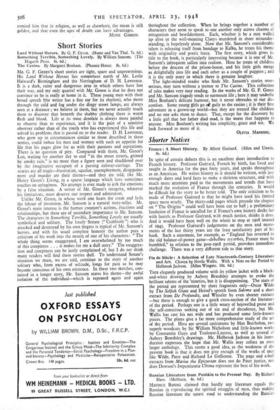Short Stories MR. G. F. GREEN'S short stories are tight,
spare and unpretentious. His Land Without Heroes lies somewhere north of Mr. Leslie Halward's Birmingham and the Nottingham of D. H. Lawrence. It is a dark, rainy and -dangerous area in which others have lost their way, and my only quarrel with Mr. Green is that he does not convince us he is really at home in it. These young men with their broad speech the writer has a fine ear for its rhythm), who move through the cold and fog under the dingy street lamps, are always seen at a distance; we believe in them, but we never actually touch that them to discover at beneath the shabby, clothing there is warm flesh and blood. Life at its most -desolate is . always more painful to observe than to experience, and it is the pain of a sensitive observer rather than of the youth who has experienced this life and solved its problems that is passed on to the reader. D. H. Lawrence, who grew -up in circumstances similar to those described in these stories, could imbue his' men and women with such an appetite for life that his pages glow for us with their passions and aspirations. There is no question of pity. Compared with them, Mr. Green's Len, waiting for another day to end "in the mean streets, grimed by smoky rain," is no more than a figure seen and shuddered over by the imaginative occupant of a passing railway-carriage. The stories are all tragic—frustration, squalor, unemployment, disappoint- ment and murder are their themes—and they are told, like Mr. Henry Green's Living, in a sparse language which here sometimes touches on stringiness. No attempt is ever made to jerk the emotions by a false situation. A writer of Mr. Green's integrity, whatever his limitations, must deserve our respect and admiration.
Unlike Mr. Green, in whose work one hears the creak and feels the labour of invention, Mr. Sansom is a natural Story-teller. Mr. Green's main interest is the human creature's actions, reactions and relationships, but these are of secondary importance to Mr. Sansom. The characters in Something Terrible, Something Lovely are usually symbolical and solitary. The lonely' Senate (" Crabfroth ") who is attacked and destroyed by his own fingers is typical of Mr. Sansom's heroes, and with his usual complete honesty the author puts a criticism of his work into the mouth of one of his characters : " The whole thing seems exaggerated, I am overwhelmed by too much of this creepiness . . . it makes for me a dull story." The exaggera- tion and creepiness can be justly complained of, but I do not think many readers will find these stories dull. To understand Senate's situation we must, we are told, continue to the story of another solitary who, from excess of solitude, longs for pain so he may become conscious of his own existence. In these two sketches, con- tained in a longer story, Mr. Sansom states his theme—the awful isolation of the individual—which is repeated again and again throughout the collection. When he brings together a number of characters they seem to speak to one another only across chasms of antagonism and bewilderment. Each, whether it be a nun walled up alive or the well-meaning Claeys -murdered in sheer misunder- standing, is hopelessly alone. Now that Mr. Sansom's considerable talent is releasing itself from bondage to Kafka, he treats his theme with originality and poetic force. The first story, which gives its title to the book, is particularly interesting because it is one 'of Mr. Sansom's infrequent salliei into realism. Here he treats of children before the descent of the prison-house, and his little girls merge as delightfully into life and each other as a couple of puppies ; and it is the only story in which there is genuine laughter.
The light-minded reader who finds Mr. Sansom's stories over- serious, may turn without a tremor to The Casino. This collection of tales makes very easy reading. -In the works of Mr. G. F. Green and Mr. Sansom tragedy tends to surmount life ; here it may underlie Miss Bonham's delicate humour, but it never obtrudes to our dis- comfort. Some young girls go off gaily to the casino it is their first adventure in a grown-tip world—but they are treated like children and no one asks them to dance. That, except for the discovery by a little girl that her father died mad, is the worst that happens to anyone. Miss Bonham's writing has simplicity, grace and wit. We look forward to more of it.
OLIVIA MANNING.


































 Previous page
Previous page